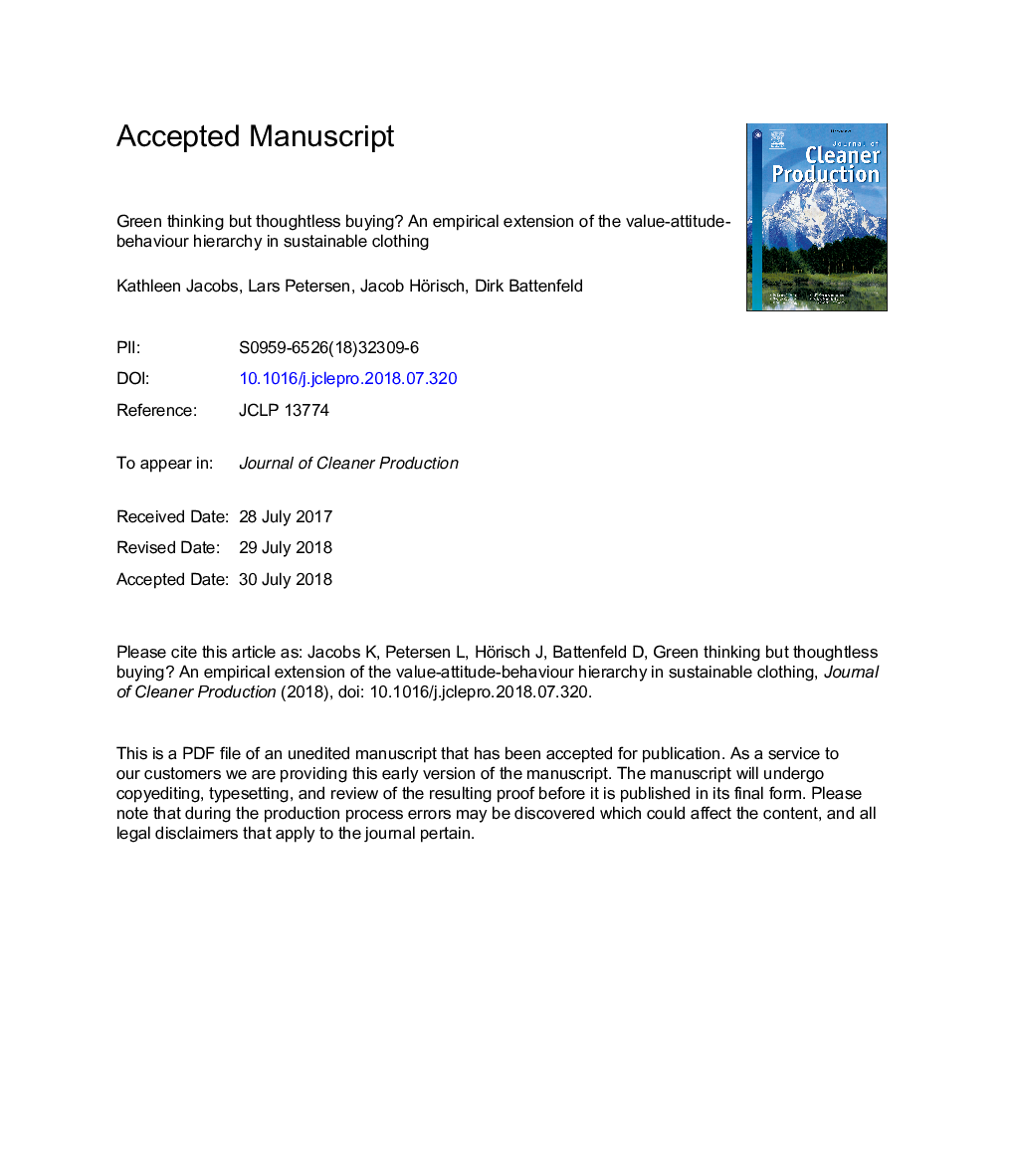| کد مقاله | کد نشریه | سال انتشار | مقاله انگلیسی | نسخه تمام متن |
|---|---|---|---|---|
| 10142689 | 1646105 | 2018 | 33 صفحه PDF | دانلود رایگان |
عنوان انگلیسی مقاله ISI
Green thinking but thoughtless buying? An empirical extension of the value-attitude-behaviour hierarchy in sustainable clothing
ترجمه فارسی عنوان
تفکر سبز اما خرید فریبنده؟ گسترش تجربی سلسله مراتب ارزش-نگرش-رفتار در لباس پایدار
دانلود مقاله + سفارش ترجمه
دانلود مقاله ISI انگلیسی
رایگان برای ایرانیان
کلمات کلیدی
شکاف رفتاری و رفتاری، عوامل تعیین کننده، مدل سازی معادلات ساختاری، لباس پایدار، مصرف پایدار، سلسله مراتب رفتار-نگرش-ارزش،
ترجمه چکیده
صنعت پوشاک دارای پتانسیل زیادی برای بهبود در مورد جنبه های مختلف پایداری است. اگر چه در سال های گذشته نگرش مصرف کنندگان نسبت به محصولات و خدمات پایدار، هم به طور کلی و هم به طور خاص در لباس، در سال های گذشته بیشتر و بیشتر مطلوب بوده است، سهم بازار لباس های تولید شده در راه های سازگار با محیط زیست و اجتماعی، هنوز از پیش رفته است. این مقاله تجربی این پدیده را، که به عنوان شکاف نگرش-رفتاری شناخته می شود، در زمینه لباس پایدار بررسی می کند. بر اساس یک نمونه بزرگ از مصرف کنندگان زن آلمانی، یک مدل معادلات ساختاری برای ارزیابی میزان شکاف نگرش رفتاری و تاثیر احتمالی عوامل موثر بر رفتار خرید پایدار پوشاک تخمینی می شود. سلسله مراتب ارزش-نگرش-رفتاری به عنوان یک چارچوب نظری مورد استفاده قرار می گیرد که توسط ساختارهای روانشناختی بیشتر که فرضیه ای برای تأثیر رفتار است تقویت می شود. به استثنای نگرش رفتاری و رفتاری قابل توجه، این مقاله نشان می دهد که نگرش مثبت نسبت به استانداردهای لباس های اجتماعی، محیط زیستی و بی نظیر و همچنین وابستگی به خرید آنلاین و کاتالوگ، افزایش خرید لباس پایدار است. ارزش های انسانی و هودونی و به طرز چشمگیری ترجیح دادن لباس های دوامدار مانع رفتار خرید لباس پایدار می شود. اثرات مهم موانع مشکوک - آگاهی مد و حساسیت قیمت - مشخص نشده است. نتایج به این ترتیب اهمیت تغییر نگرش و ارزش نسبت به پایداری و تمرکز بر دوام لباس پایدار و دسترسی آن از طریق فروشگاه های خرده فروشی را برجسته می کند.
موضوعات مرتبط
مهندسی و علوم پایه
مهندسی انرژی
انرژی های تجدید پذیر، توسعه پایدار و محیط زیست
چکیده انگلیسی
The clothing industry holds huge potential for improvement concerning various aspects of sustainability. Although consumer attitudes towards sustainable products and services, both in general and specifically in clothing, have grown more and more favourable in the past years, the market share of clothing produced in environmentally friendly and socially responsible ways is still lagging behind. This article empirically investigates this phenomenon, known as the attitude-behaviour gap, in the context of sustainable clothing. Based on a large sample of female German consumers, a structural equation model is estimated to assess the magnitude of the attitude-behaviour gap and the impact of possible enablers of, and barriers to, sustainable clothing purchase behaviour. The value-attitude-behaviour hierarchy is used as a theoretical framework, augmented by further psychographic constructs hypothesised to influence behaviour. Apart from a considerable attitude-behaviour gap, the article indicates that a positive attitude towards social-ecological clothing standards, biospheric and altruistic values, as well as an affinity to online and catalogue shopping, enhance sustainable clothing purchases. Egoistic and hedonic values and, remarkably, a preference for durable clothing hinder sustainable clothing purchase behaviour. No significant effects of the suspected barriers - fashion consciousness and price sensitivity - have been identified. The results thus highlight the importance of changing attitudes and values towards sustainability, and of focusing on the durability of sustainable clothing and its availability via retail stores.
ناشر
Database: Elsevier - ScienceDirect (ساینس دایرکت)
Journal: Journal of Cleaner Production - Volume 203, 1 December 2018, Pages 1155-1169
Journal: Journal of Cleaner Production - Volume 203, 1 December 2018, Pages 1155-1169
نویسندگان
Kathleen Jacobs, Lars Petersen, Jacob Hörisch, Dirk Battenfeld,
